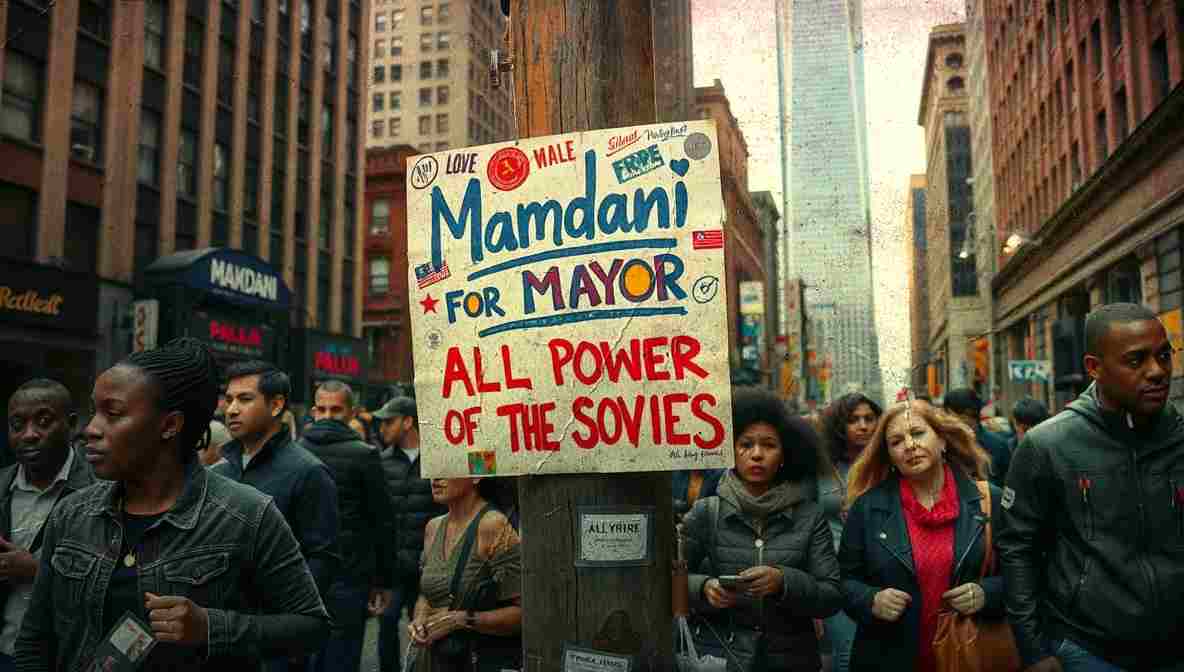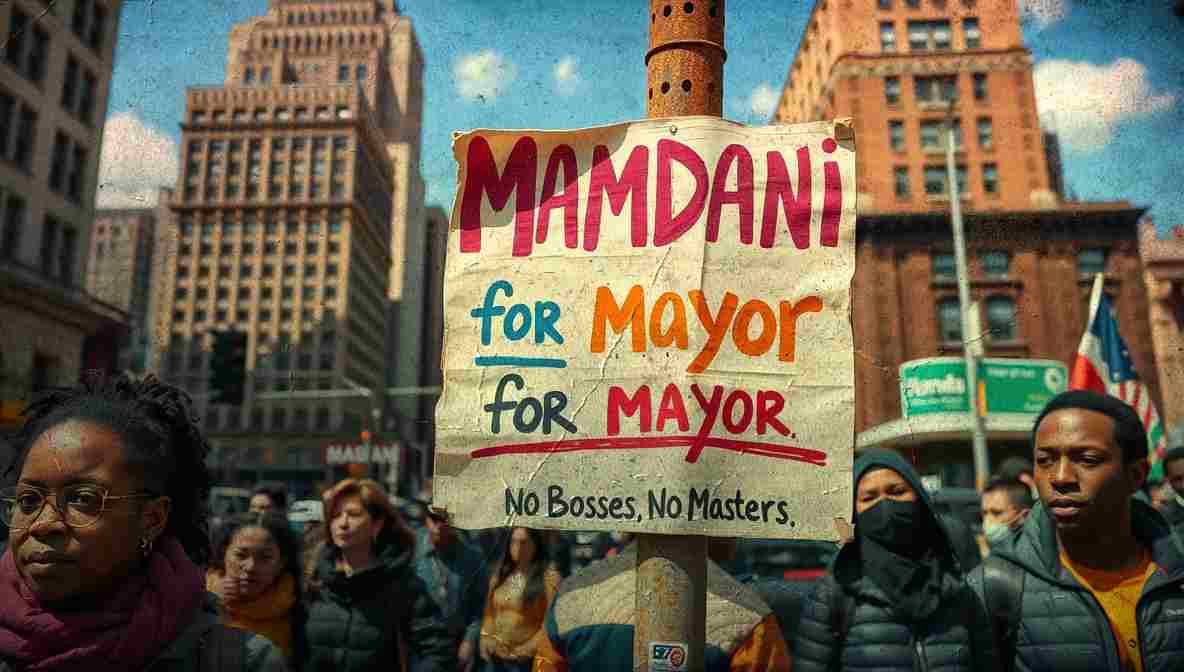NYC Voters Flood Polls as Grassroots Movement Defies Billionaire Intimidation
Democracy Accidentally Works, Nation Stunned
In a development that has confused political consultants and terrified hedge fund managers, New York City voters are turning out in record numbers to support Zohran Mamdani, the Democratic Socialist candidate who committed the apparently revolutionary act of asking voters what they wanted instead of asking billionaires for permission. The grassroots movement has managed to do something previously thought impossible: organize more effectively than people with unlimited money.
The voter turnout surge represents a direct middle finger to the $19 million spent by billionaires to defeat Mamdani, proving that while money can buy ads, it apparently can’t buy enough of them to convince people that affordable housing is actually bad. Political scientists are calling this “an anomaly,” which is academic speak for “oh shit, democracy might still work.”
When Knocking Doors Beats Buying Ads
“They knocked on every door,” Dave Chappelle said at his show. “That’s old-school organizing. While billionaires were spending millions on TV ads nobody watches, Mamdani’s people were out there talking to voters. Revolutionary concept: actually talking to people. Crazy, right? Turns out human contact is more effective than a rich guy’s attack ad during a commercial break.”
The Mamdani campaign’s ground game involved thousands of volunteers doing the unglamorous work of democracy: knocking doors, making calls, registering voters, and explaining policies without a focus group in sight. It’s the political equivalent of bringing a knife to a gunfight and discovering the knife works better because you’re in a phone booth.
Organizing Beats Money, Consultants Panic
Political consultants who make six figures telling candidates to moderate their positions and court wealthy donors are currently updating their resumes. The DSA’s grassroots strategy, which involved believing in something and telling people about it, has proven more effective than $19 million in billionaire-funded propaganda. This threatens to put an entire industry out of work.
“Consultants are freaking out,” Bill Burr said on his podcast. “Their whole business model is telling candidates to be boring and raise money. Now someone’s winning by being interesting and organizing people. That’s a problem for them. If candidates can win without being corporate-friendly moderate robots, what do they need consultants for? To tell them to sell out? They can figure that out themselves.”
Young Voters Discover Elections Are Actually Important
Millennials and Gen Z voters, who are usually too busy being broke to vote, have turned out in unprecedented numbers. Apparently, the prospect of someone who might actually address the fact that rent costs more than a small nation’s GDP was sufficiently motivating to get them to polling stations.
“Young people are voting,” Trevor Noah said. “That’s how you know this is serious. Young people don’t vote. They tweet. They post. They share memes. Actually showing up to vote? That requires caring. And they care. They care because Mamdani’s talking about shit that matters to them. Not culture war bullshit. Actual material conditions. Housing. Jobs. Not dying from preventable shit.”
The Rent is Too Damn High Becomes Electoral Strategy
Mamdani’s platform directly addresses the concerns of young voters: unaffordable housing, stagnant wages, student debt, and the general sense that the system is rigged against them. This approach, known as “addressing people’s actual problems,” has proven shockingly effective compared to the traditional strategy of pretending everything is fine.
“He’s talking about rent,” Chris Rock said. “That’s it. That’s the secret. Young people can’t afford to live. So he’s saying, ‘Let’s fix that.’ Boom. Instant support. Other politicians are like, ‘The economy is great!’ Brother, I have three roommates and I’m 35. The economy is not great. Mamdani’s the only one admitting it.”
Working Class New Yorkers Remember They Outnumber Billionaires
In a mathematical twist that has baffled the wealthy, working-class New Yorkers have realized they significantly outnumber billionaires. This discovery, combined with the fact that elections are technically based on votes rather than net worth, has created an unprecedented situation where democracy might actually be democratic.
“There are more of us than them,” Amy Schumer said during her show. “We forget that. They spend so much money that we think they’re more powerful. But in an election, one person, one vote. They can spend $19 million, but they still only get one vote each. We’ve got millions of votes. We just have to use them. And it looks like we are. About damn time.”
Union Members Vote Their Interests, Conservatives Shocked
Despite some union leadership refusing to endorse Mamdani, rank-and-file members are voting for him in droves. Turns out workers prefer candidates who support workers’ rights over candidates who promise to protect business owners’ rights to exploit workers. Who knew?
“Union members are voting for the guy who supports unions,” Kevin Hart said. “Shocking development. Absolutely stunning. Nobody could have predicted this. Except literally everyone who isn’t a paid consultant. Workers voting for someone who wants to help workers. This is groundbreaking stuff, folks. Next you’re gonna tell me firefighters support fire safety.”
The Social Media Ground Game
While billionaires bought TV ads that everyone skips, Mamdani’s supporters created a social media movement that reached voters where they actually are: their phones. The campaign went viral not because it paid for promotion, but because people actually believed in it enough to share it. This organic reach, which costs nothing, proved more valuable than millions in paid advertising.
“The TikTok game is strong,” Ricky Gervais said. “These kids are making videos explaining policy. Explaining why billionaire taxes matter. Making it entertaining. Meanwhile, the billionaires are running boring TV ads that nobody watches. You can’t buy authentic enthusiasm. You can rent it, but it shows. This is real. And real beats paid every time.”
Memes for Material Change
The Mamdani campaign has effectively weaponized humor, creating shareable content that makes complex policy accessible and entertaining. This approach, known as “not being boring,” has proven remarkably effective compared to traditional political messaging that reads like it was written by a committee of robots.
“They’re memeing their way to power,” Sarah Silverman said. “And it’s working. Political memes used to be stupid. Now they’re smart. They’re funny and educational. You learn about policy while laughing. That’s more effective than any 30-second attack ad. You can’t meme your way out of being a corrupt billionaire, but you can meme your way into explaining why we should tax them.”
The Coalition Nobody Expected
Mamdani’s support base is surprisingly diverse: young progressives, working-class families, immigrants, and even some business owners who recognize that a functioning city requires investment. This coalition was supposed to be impossible to build, according to consultants who assume everyone is as cynical as they are.
“The coalition is beautiful,” Jerry Seinfeld said at the Comedy Cellar. “It’s not just white college kids. It’s everyone who’s been getting screwed. Immigrants who can’t afford rent. Workers whose wages haven’t moved in decades. Small business owners crushed by commercial rent. They’ve all realized they have a common enemy: the billionaires who’ve been extracting wealth from the city. United by being exploited. That’s organizing.”
Immigrant Communities Stand with Socialist Immigrant
Mamdani, an immigrant himself, has strong support from immigrant communities who recognize that his policies would directly benefit them. This has confused Republicans who assumed immigrants would automatically fear the word “socialist.” Turns out, people care more about housing and wages than labels.
“Immigrants are supporting the socialist,” Tom Segura said. “Republicans are shocked. They thought calling him a socialist would scare immigrants. But immigrants are like, ‘He wants to make rent affordable and give us healthcare? That’s socialism? Cool. We’re in.’ Turns out policy matters more than scary words. Who knew?”
Election Day Energy Defies Cynicism
Polling stations across NYC report lines of voters who actually seem engaged and energized, which is approximately the opposite of typical American electoral energy. People are treating this like it matters, which is either inspiring or terrifying depending on whether you’re a voter or a billionaire.
“The energy is wild,” Jo Koy said. “People are excited to vote. When’s the last time you saw that? Usually, voting is a chore. Something you do between errands. Now people are showing up with energy. With hope. That’s what happens when you give them something to vote for instead of just something to vote against.”
Hope as Political Strategy
The Mamdani campaign has deployed something rare in modern politics: genuine hope. Not Obama’s branded Hope(TM) that came with disappointment attached, but actual belief that things could be different. This strategy, known as “not being cynical,” has mobilized voters who had previously given up on electoral politics.
“They’re running on hope,” Hasan Minhaj said. “Real hope. Not ‘hope and change’ that changes nothing. Actual hope that someone might fight for you. That’s powerful. That’s dangerous. That’s why the establishment hates it. Hope makes people organize. Cynicism keeps people home. They want us cynical. Mamdani’s campaign is the opposite of cynicism. That’s why it’s working.”
When Grassroots Beats Astroturf
The contrast between Mamdani’s grassroots movement and the billionaire-funded opposition couldn’t be starker. One side has volunteers who believe. The other has paid staffers who clock out at 5 PM. One side has momentum. The other has money. And in this race, momentum is winning.
“Real versus fake,” Gabriel Iglesias said. “That’s what this is. Mamdani’s got real support. Real volunteers. Real enthusiasm. The other side has money buying fake support. Paid canvassers who don’t care. Astroturf pretending to be grassroots. Voters can tell the difference. You can fake a lot of things in politics, but you can’t fake thousands of people showing up because they believe.”
The Volunteer Army Nobody Paid For
Thousands of volunteers have donated time to the Mamdani campaign, doing the unglamorous work of democracy without pay. This army of believers has proven more effective than the paid operatives working for better-funded campaigns. Turns out, people who care work harder than people who are paid to pretend to care.
“The volunteers are incredible,” Nate Bargatze said during his set. “They’re not getting paid. They’re out there because they believe. That’s powerful. You can’t buy that. Well, you can try to buy it, and billionaires are trying. But $19 million can’t match thousands of people who actually give a shit. Money can’t buy authentic passion. It can rent it for a while, but it doesn’t last.”
As polls close across New York City, the grassroots movement that built Mamdani’s campaign watches anxiously. They’ve done something remarkable: they’ve built a political coalition strong enough to challenge billionaire power. Whether it’s strong enough to defeat it remains to be seen, but the fact that it exists at all is revolutionary.
Auf Wiedersehen, amigos.



